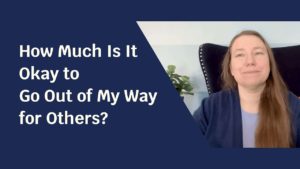
How Much Is It Okay to Go Out of My Way for Others?
As you’re learning to establish healthier relationships and boundaries, the question comes up, “How much is it healthy to do things for others that use my own energy and effort?”
I remember being in autistic burnout all too well (though I didn’t have a name for it at the time).
I was so tired. All the time. Tired of saying I was tired all the time. Tired to the bones. I mean exhausted. Is this familiar? Can you even remember the last time you felt fully rested?
But it’s not just the exhaustion. (As if that’s not enough.) Everything’s hard. Dragging yourself to work. Dealing with family. Leaving the house feels like preparing to climb Mount Everest. Even friggin’ getting the mail involves so many steps.
I’m guessing you’ve already cut back so much in your life, but it’s never enough.

How is it that other people manage??
Sure, they say they’re stressed, but they’re doing more than you, yet you’re barely functioning??? It doesn’t make sense. It’s not fair. And there’s a niggling fear that it’s because there’s something fundamentally wrong with you.
Are you weak? Is this your fault? It doesn’t help that certain people (your boss, partner, parent, ex-therapist, the other moms) make little comments along those lines.
Because, let’s face it, your brain feels like it’s been scraped out and replaced with a thick fog. You can’t manage the dishes and schedule appointments and find the kid’s shoes and get yourself food, and remember litter for the cat. I mean, who can keep track of all of that???
Some days, just getting out of bed feels like a triumph.
And even one thing on your schedule means the whole day is shot.
You can take zero stress. Zero pressure. Every “little” thing is a BIG FRIGGIN’ DEAL.
Life shouldn’t be this hard.
This isn’t normal.

Not even for you. It hasn’t always been this bad. Things have been getting harder.
You can’t do things you used to be able to. You don’t even care about things you used to anymore. You spend a lot of time doing nothing. Everything sucks.
The thought of going back to work tomorrow (or ever) or of applying for jobs, fills you with dread.
And – TMI time – showering, brushing teeth, keeping yourself clean and fed, is a slog of endlessly repeating nonsense that feels hard and pointless and, let’s face it, icky. Why does the human body need so much work??? Ugh.
And don’t get me started on socializing. “Just go out more,” they say. “It’ll be fun,” they say. But you get home wiped and need three days to recover, minimum. Or a week.
You can’t keep on like this. Something has to give. But you’ve tried the standard advice, even some weird shit, but it doesn’t help enough, or at all, or is actively counter-productive.
Is this a bit too familiar? Yeah, I get it. I’ve been there. Too many times. For far too long.
And I’ve gotten out.
Really.
More on that soon.
But first, a bit more about you.
I think I can also relate to what you want. You’re not asking for the Moon.
You don’t absolutely need a pile of money and a team of silent, robotic servants to magically appear and take care of all your needs forever, without any human interaction. (Although, hey, that would be wonderful, where do I sign up?)
But you do need solutions. For your real life. And that’s entirely reasonable.
It’s entirely reasonable, and possible, to build a life that feels good and is sustainable for your Autistic brain and nervous system. To have reliable energy, think clearly, and be able to manage day to day life, generate a stable income, and take care of the responsibilities you choose to take on. To feel capable again.
It’s entirely reasonable, and possible, to feel more comfortable with yourself, with others, and build positive relationships that feel good.
To feel hope. To dream again. And maybe even have enough energy to make a positive impact on the world.
That’s not too much to ask.

In fact, that’s entirely reasonable. And possible. Even for your wonderfully Autistic or AuDHD self.

Have you tried meditation, medication, CBT, or years of therapy? What about exercise, epsom salt baths, getting out into nature, positive affirmations, or accepting your limitations?
Have you tried to get accommodations at work, or take time off?
Do you routinely make excuses to friends and family to get out of “fun activities” that are, in fact, a sensory nightmare?
Maybe you sleep as much as you can, isolate so you don’t have to deal with being perceived, and try to engage in special interests, but they don’t feel the same anymore.
I’m guessing you’ve also explained it to people over and over, told them what you need, and they just don’t get it. Professional “experts” don’t get it. Some don’t even bother trying to listen.
Others just complain that “this isn’t who you used to be,” and expect you to snap out of it, to go back to “normal.”
Probably some of that has helped, sometimes, for a while, but it’s never enough, and not sustainable.
And you would have tried more, but there’s no point wasting your little energy on stuff that’s clearly not going to work.
Can I take a moment to acknowledge that this really is hard. So damn hard. And flippin’ unfair.
There. I said it. And it’s true.
But you’re NOT broken, defective, or the only one struggling like this.

Those solutions were built by ableist neurotypicals, for ableist neurotypicals, and they’re trying to smush us back to functioning in an ableist neurotypical way.
Which, news flash, is precisely what got you into this mess. So doing more of that, harder, isn’t going to get you out of it.
No wonder you’re not motivated to follow their advice! It’s all built on the same flawed premise that you can “behave” or medicate your way into being neurotypical. Not gonna happen.
Ultimately, none of that stuff address the root of the issue.
Because it wasn’t built for your neurotype, your needs, how your brain and nervous system function, or your identity.
And let’s be honest. A lot of the standard advice essentially boils down to, “You should practice self-care so you can continue the charade longer.”
It’s just another way to squish your autistic peg into yet another neuronormative hellhole, and then blame you when it doesn’t work.
Deep breath.
Okay, to be fair, not all the advice out there is crap, but a lot of it is. And the rest either isn’t tailored for Autistics, or doesn’t do enough to fully get out of burnout and stay out.

So what will work?
Well, first and foremost, it needs to work for your real life, not some fantasy world or ableist neurotypical farce.

I know you can’t quit your job, your family, and all your responsibilities, as appealing as that may be sometimes.
And yet, your impulse to cut back on things has been spot on.
Cutting back on work hours, without changing the actual conditions of your work, doesn’t make as much of a difference as one would hope.
Getting out of social events, while feeling guilty at home and stressing over what they’re thinking about you and when they’ll be back, isn’t as restorative as one would like it to be.
On the other hand, decades of trying to conform to neurotypical expectations have left their mark, and cutting back on those will help tremendously.
The way I see it, sustainable recovery is just as much about unlearning ableist crap as it is about learning skills for a healthy Autistic life.
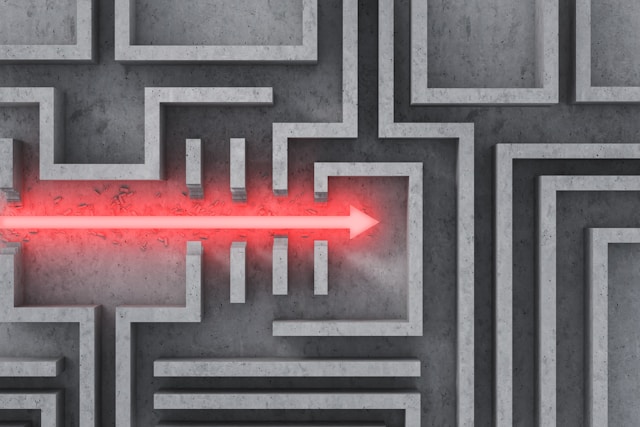
The five key, interrelated areas are:
In my autistic burnout recovery system, each of these areas includes both unlearning, and learning components.
And I’ve tried to keep it super practical and realistic.
Remember when I mentioned that I’ve been burnout-free since 2015? It’s true.
By the way, I’m Heather, I’m Autistic and AuDHD, and I know this burnout stuff so intimately because I’ve been through two major, life-halting burnouts, and a dozen smaller ones throughout my life, and searched for years to find anything that would help provide more than minor, temporary relief.
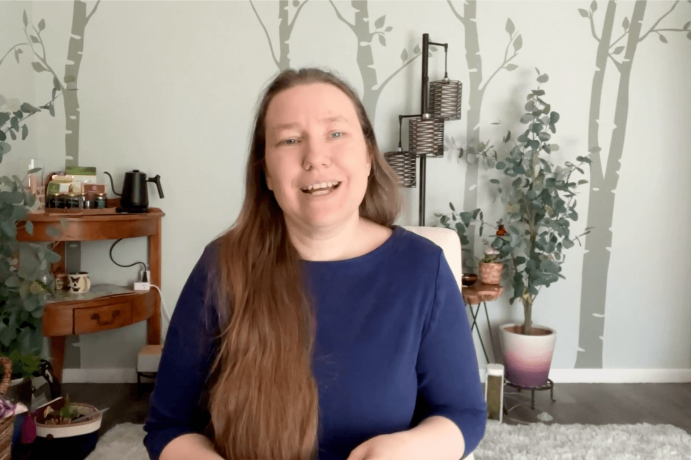
I tried just about everything to get my life back. I struggled for years to find anything that actually helped, and threw away what didn’t.
After my last burnout, in 2015, I reached the point where enough was enough. I knew in my gut that I had to entirely overhaul my life or I would die. I went whole hog, making huge changes all at once, but I don’t think that’s necessary.
But I didn’t get my life back.
By which I mean, I didn’t go back to the damaging, ableist lifestyle that had hurt me over and over.
It took years of trial and error, experimentation, and refining, to sort out what actually worked from what just claimed it would, but didn’t, and to get clear on why that worked so I could reproduce it, and to test that it wasn’t just me, that this works for many other Autistics as well.
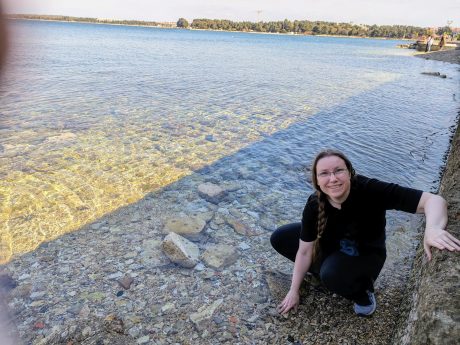

Over the last four years, I’ve helped over a hundred other Autistics customize their own versions of the same process, and make significant improvements in their burnout recovery.
And for the last year and a half, my pattern-loving brain has been working at systematizing what has consistently been helpful for all of us, to make that easily available to more people, with less effort. This course is the result!
My autistic burnout recovery system offers:
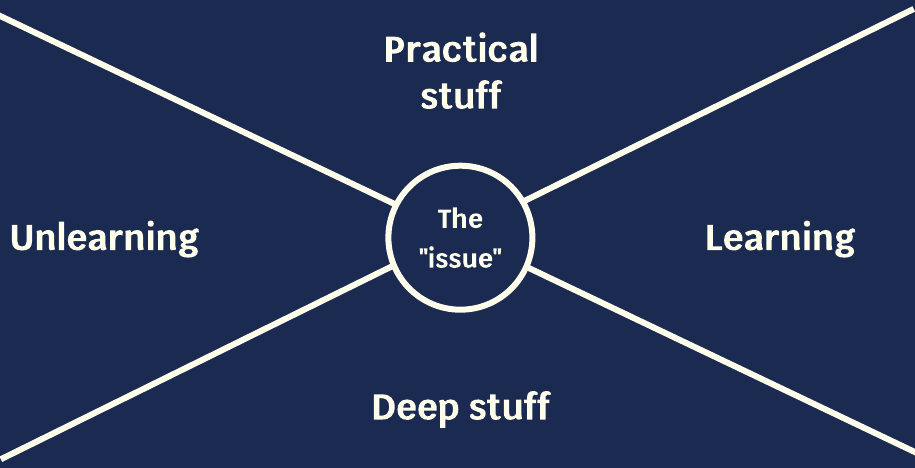
Okay, that all seems great, but I can practically hear you asking, “But how is this actually going to work? What will I have to do?”
Fair question. Here’s an overview of what the course will entail:
Introduction to the system of burnout recovery. Explore why life/everything has been so hard (psst, it’s not your fault, it’s stacked against you). And find reasons to hope that there are ways around the roadblocks.
Practice several techniques to notice and dissolve internalized ableism and other negative messaging, without accidentally gaslighting yourself.
Masking/camouflaging less, to the extent that it is safe, when it is available to you. Figuring out what’s you and what’s the mask. Exploring your own wants and needs.
Gently and gradually building useful (non-overwhelming) and real-time awareness of what you need and want, and what is getting in the way, and how the inner and outer world affect you, so you can do something about it.
Get better acquainted with what you have already done to accommodate your sensory needs over the years, and giving yourself permission to do that more intentionally, and to a greater degree. Exploring new ideas and options.
Everything we’ve been doing so far will be freeing up a bit more energy, and now we’ll practice how to tell before you overdo it, so you can keep building and storing energy for when you need it.

Throughout this course, you’ll gradually delve into understanding your own needs, hangups, and unwanted patterns, you’ll deconstruct negative messaging, and get a glimpse of what is possible, with gentle but poignant practices aimed at cultivating radical self-acceptance and releasing untrue self-judgments.
Over time, your personal insights and these foundational skills will start to create a ripple effect in how you deal with other areas of your life.
And don’t worry, you’ll have support through the process.

This is my first time offering my autistic burnout recovery system as a “course,” and I’ll be honest, this format is a test. But the strategies and system are not.
I’ve helped over a hundred Autistic and AuDHD adults (and a few teens) to make progress in their burnout recovery, and this is my attempt to take the core of what I do and offer it to you on a silver platter, for much easier and faster results than I got (as in, not spending years having no idea if anything would ever work).
So…
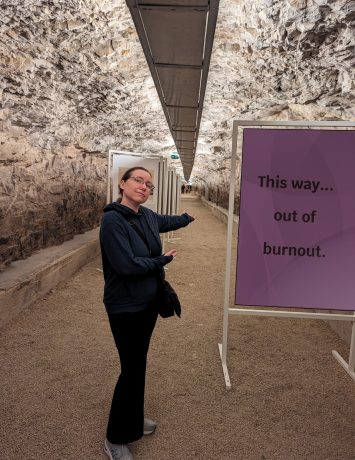
My actual clients, who provided the testimonials throughout this page, have spent anywhere between (cough, cough) $4,000 and $6,000 with me for individualized, personalized help, over one to two years on average. And they’ve gotten great results they love!
That’s a lot of time and money.
Don’t worry, I’m not going to ask you for that much. For a group program, I would naturally charge less, but could still reasonably price this at $1,200 for the amount of info and value I’m packing into this program. And I probably will, when I’ve got the kinks worked out.
But since this is a first run of this format, and there are bound to be hiccups along the way, and I’m hoping for your feedback on what works best and what is not as useful to you, I’m offering this for a special first-time price.
You’ll get:
Anticipated time investment to get results: 1-3 hours per week, plus meetings.
One 5-hour meeting a month, and one 90-minute meeting a month, on the first and second Saturdays. Both are recorded and transcribed so attendance is optional.
You can do the entire course on your own if that works best for you, by watching/listening to/reading transcripts of the recordings. Or join us live to ask questions along the way.
Either way, you’ll get full access to all additional resources, examples, worksheets, journaling/reflection prompts, and more.
Alongside the core of the program, you’ll also get a selection of super practical tools, including:
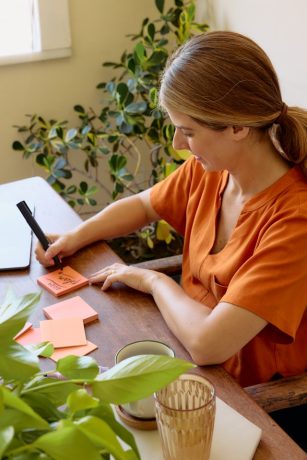
FYI, the live course is over now, but you can still get access!
It’s designed so that anyone who wants to can use it as an asynchronous course.
You’ll get instant access to the workshop recordings and transcripts, all materials and resources.

My goal is for this to help you improve your burnout.
It’ll take time and input on your part to work through the things that need to be worked through, and to make at least a few little changes to start with, leading to more over time, but I truly believe that this will help.
But if it doesn’t, I don’t want you to be out the money.
So here’s my promise to you:
Basically, if you sign up and don’t use the course, that’s on you. But if you give it a fair shot and it doesn’t actually help you, that’s on me. Is that fair?
To make the life-altering changes that will really be needed for full, sustainable recovery, it’s going to take longer than six months.
But I expect that you’ll be able to tell within six months whether you’re on the right track, and feel tangible improvements.
to undo the effects of capitalist, colonized, ableist, neurotypical, and traumatized standards (CAN’T) culture, and continue transferring that energy into building your autism-and-neurodivergence-positive life (PLAN),



1st Saturdays – Workshop days
2nd Saturdays – Group coaching
Yes, the breaks for the long workshop day will be scheduled.
There will be a 40 minute break right in the middle, a 10 minute break in the middle of the first half, and a 10 minute break in the middle of the second half.
Quite a lot.
*The presenter is trauma-informed and trauma-sensitive, but you are the best judge of what you can handle at the moment. Please take care of yourself.
There are a range of people in the group, some are more in burnout currently, and some have been through it before and want to stay out. If you’re in this second group, you’ll have more capacity to implement things we talk about, to ensure that you won’t go through that again.
The core of the system is about making a genuinely autism-positive life for yourself, which, when you do it, results in getting out of burnout and staying out.
So if the descriptions throughout this page, and this vision of a better future resonate with you, and you want to learn how to make that vision realistic in your life, that’s what we’re going to be doing. It’s “the how” to do that, not just the philosophy of, “oh, that sounds like a good idea.”
Nope. Or, rather, only to the extent you choose.
You can treat this entirely as an asynchronous course, and do it all on your own via the recordings and transcripts and the materials online, and you’ll get a ton out of it.
Or you can attend the meetings incognito, with camera off, and never chime in, and that’s all good as well.
Or you can contribute to the online discussions as little, as much, and when you choose.
The materials are designed to provide a lot of value with any of those options.
You can definitely come and go as you please. I don’t expect everyone will be able to attend all of every meeting, because we all have lives and responsibilities that we can’t avoid, and occasional schedule conflicts.
The recordings and transcripts will be available for any parts you miss, that you want.
Both this course and my coaching are very much rooted in my philosophy, and my particular style. So you’ll get some of the same types of things with both.
The biggest difference is that coaching is more personalized, helping you work with through your particular things, at your pace, according to your priorities.
The course is more systematized to teach the “how to” work through things, in an order that makes sense to me from having worked with over 100 Autistics on burnout. However, you have to do a lot of the actual working through things more on your own. There will be support, and modeling, and guidance, and space for questions, but it’s not as hand-holding.
Another big difference is the cost. When you stick with coaching, it can add up to a lot more than this course.
My clients who have made the most progress on their burnout recovery have stuck with it for 1-2 years and often spent $3,000 -$4,000 with me. Whereas the course is currently only $500. (That’s about 4 coaching sessions with me.)
So, which should you choose?
That’ll depend on which is a better fit for you at this time.
By the way, it doesn’t have to be either-or. They can be great complements to each other.
At some points in the course, you may want help processing some personal insight or figuring out your best next steps. You’re welcome to book a one-off coaching session at any time.
But it doesn’t need to be me. If you have another autistic coach, or therapist, or chosen family, whom you already trust, they can be a great support during this.
The whole premise of how I’m setting this up is expecting that you won’t be able to quit significant responsibilities. So I’m not going to tell you to take time off or get a babysitter and expect everything will be fine. It doesn’t work like that.
I find that a major source of energy drain is in the internal conflict between the societal messaging we have been trained to believe and the reality of our lives. And when you reduce that conflict, chunks of energy get freed up that you can then use to make your life better in very practical ways. Often in little ways, but they add up.
I totally respect that. I’ve no doubt you’ve got a lot on your plate, or it feels like a lot (even if you objectively don’t have a lot going on). That’s how burnout is. I’m also wondering if that’s likely to change without you doing something to make it change.
Part of the point of this program is learning how to get rid of things in your life that are taking up your time and energy, that don’t need to be. So although this program will take some time, it’s also intended to give you back more time.
And isn’t this when you would like the extra support? When you’re busy?
I’m not sure if this applies to you. I totally respect your right to make the decision about whether this is the right time for you. These are just a few of my thoughts.
Yep. There’s a 6-month payment plan. And if you need an extended payment plan, email me and we’ll work something out. Here’s a sample script to make emailing easier:
Hi Heather,
I’m ready to take your burnout course, but it would really help to break the payment into smaller chunks. I can pay $X USD per month until it’s paid off. Will that work for you?
Thanks in advance,
Name
Ugh, I got an unexpected bill in the mail recently for a large medical expense that I thought my insurance had covered three years ago! Has something like that ever happened to you?
I hate it so much when some unexpected expense comes up and suddenly you need to shell out cash to someone that you don’t even care about, for something that you don’t want.
But the thing is, every time that’s happened, I’ve always managed to come up with that money.
It sucked, and I hated it, but I did it. And that was for paying for something that I didn’t even want, for someone else!
It was hard for me to start spending money on myself. But when I was in my “change-everything-in-my-life-because-now-I-know-I’m-autistic-and-I-want-a-better-future” phase, I started thinking about the person I wanted to be, and imagining her, and it started feeling possible.
And there was a part of me that knew, in my core, that it was only going to be possible if I started taking care of my future self in advance, so that she could come into being. And that meant spending money on myself the way that I had been spending money on other people. And being just as resourceful in finding ways to get the things that I needed, that I had been when it came to paying for the bills that I hated.
I know it’s not as easy as just thinking about it differently, but thinking about it differently is what made it start becoming possible. And sometimes I just needed permission to spend money on myself.
Sometimes I genuinely have that permission, and I still don’t have the money. So if you need an extended payment plan, email me. We can work something out to make it possible for you.
By the way, that medical bill turned out to be inaccurate (yay!), but it still took time and energy for me to find the paperwork and submit it and talk to the people and take care of all the things. Which I could do because I’m no longer in burnout.
The short answer is yes, with caveats. I want to go on at length about my whole philosophy of economic justice, and I will at some point, but I’ll spare you for the moment. 😉
I know there are times when there simply isn’t money, and it’s not about priorities or money mindset or scarcity mentality or conflicting pressures or anything. There just. isn’t. money.
If you’re ready for this and it’s just about funds, I will work with you to make sure you can get in.
Here are a few options.
I hope some combination of these options will make it possible for you to take the course, and be a win for both of us.
Duh. (I’m working hard to suppress a sarcastic remark here, because really, I wouldn’t expect anything else. Autism combined with burnout is a classic recipe for resisting change.)
However, I got to the point in my burnout where I hated the burnout more. It became more painful not to change than to change.
I don’t know if that’s where you’re at now, but that’s what got me to start seeking answers, because I could not imagine spending another year, five years, ten years of my life the way things were. Actually, I take that back. I could imagine it. I was living it. But I could not stomach the thought of things staying the way they were any longer.
I was already upset at wasting so many years struggling, barely functioning, and always on the brink of collapse (or over the edge, in bed for long stretches). I didn’t want to waste any more time.
Now, I’ve forgiven myself for all of that time, and I don’t feel like it was wasted, but still, I didn’t want it to be like that any longer.
My motivation at the time was strong, but it wasn’t very active. I didn’t have enough energy for it to be very active, but I used every little bit of energy that I had towards making things better. And over time, that worked.
So most of the changes I made weren’t huge. But they were important.
Where are you at currently? Is it more painful to deal with a few small changes that will lead to a few more small changes that will lead to…etc.? Or is it more painful to keep on as things are now?
Or do you have some other great idea of something that might help out? If you do, great. And by the way, I’d love to know what it is. Drop me an email sometime. Genuinely.
So, where are you at in your relationship with change or staying the same?
I want to be entirely honest and realistic with you. Is this going to get you completely free of burnout in six months? Nope. But it doesn’t need to. And here’s what I mean by that.
It took a long time for you to get to where you are now, and it’s going to take a while to get out of it. Not as long as it took to get into it, but it’s not going to be a quick fix. You already knew this. This isn’t new information.
So the question becomes, is this something that you believe will get you closer to that goal? Will this get you in the right direction? Will this give you the skills and resources that you can continue to use long past when the course is over?
I believe it will. But what really matters is whether you believe it will.
Because there’s only three other options. 1) Either this is going to move you in the opposite direction, further into burnout, which it just flatly isn’t. 2) Or you figure out something else. That’s totally open to you. Do you have other ideas? I’m sure there are other things that will help. I’m not claiming to have all the answers or this will be everything you need. 3) Or you do nothing. Which you know how that turns out. More of what you’ve got.
But I think that this will considerably shorten the amount of time and effort, and trial and error, that it takes for you to get out of burnout and start building that better life. Your Second Chance life. What do you think?
Can I share something with you that might be a little hard to hear? If you’re not up for that right now, go ahead and skip this answer.
When we’ve been deeply hurt by people, programs, systems, governments, employers, anyone – there’s the hurt that they do to us directly. That genuinely, absolutely is awful. It sucks. And then there’s also the hurt that happens indirectly. Later on. When we lose trust.
And we try to protect ourselves so much from getting hurt again, that we hold back from doing things or trying things or trusting people that could genuinely be really great for us. Because so much of our energy and focus is on not getting hurt, we end up getting hurt by missing out on so many things that could be wonderful, and staying in that hurt place. I’m speaking from hard-won experience here. Does this resonate with you?
I’m not going to try and persuade you that mine is different and that I’m the person to trust. You have access to so much of my information online. My videos, my workshops, I put out so much for free so that you can get a good taste of my point of view, my style, how I approach things, and use that to decide whether this program is the thing to take that chance on. And I don’t know what the right answer is for you.
Ironically, this is possible when you’re in what I call the deep depths of burnout. Nothing feels doable. No help feels helpful. And unfortunately, I haven’t yet hacked any kind of help that is useful in this stage.
I genuinely think it takes a lot of rest at this point to be able to get to a point where you can start doing things again that can make it better. But when you’re in those deep depths, if even this doesn’t feel manageable, this will probably be a waste of your money at this point, unless you’re just buying it to have access to it later.
But bear in mind that my guarantee probably won’t apply to you. The guarantee hinges on you participating by trying things and doing stuff. If my system doesn’t work for you, I’ll give you your money back. But if you haven’t even tried it, that’s not about my system not working.
I don’t mean to be harsh, and if it comes off that way, I apologize. I just want you to make a reasonable decision about whether this is actually going to help you or not at this moment.
I just want you to have a good experience with this course, and it not end up as one more thing that didn’t work. Just because the timing was poor.
But the timing might be better at some point down the road. I’ll be doing the course again.
You get to keep everything you’ve learned for your whole life! But seriously, I know what you’re asking.
The course lasts for six months, and you will have access to the course platform for a minimum of one year after it is over, guaranteed. But probably a lot longer. I’m using this course platform for the first time, and if I continue to like it as much as I do so far, I will keep paying them, and you can keep access to it for as long as the course exists.
I have two thoughts on that.
First, I would caution you to make sure that the person you’re buying it for is genuinely interested in doing this for themselves. If they have the motivation, and you have the money, that might be a good match.
But if you really want this to work for them, and there isn’t much, or any, motivation on their part, it’s probably not going to get you the results you want, and may frustrate your relationship with them. In short, it might just be a waste of your money.
Second, if they are genuinely on board, when you sign them up, put their name and email in the signup form so they get all of the info.
The material is intended for adults, though some teens would be perfectly able to handle it. You know your kid best.
The reading level and topics are comparable to what I write on my blog.
Because this is intended for adults, and a significant percentage of our people have been through some forms of trauma, that topic is likely to come up. It’s not likely to be discussed in detail, but we’re not going to be shying away from the acknowledgement of the existence of child abuse or sexual trauma, as well as other forms of trauma in people’s past.
I cannot control what people mention in their personal reflections on the online discussions, or what people bring up in group coaching calls.
The bottom line is that you know best what your kid can handle and what you are willing to expose them to. If you want to ask me something more specific, feel free to email me.
We start September 7, so before then.
That still gives you time to vacillate. 😉 Or you can take the plunge and spend the time from now to then looking forward to a new beginning.
FYI, the live course is over now, but you can still get access!
It’s designed so that anyone who wants to can use it as an asynchronous course.
You’ll get instant access to the workshop recordings and transcripts, all materials and resources.

As you’re learning to establish healthier relationships and boundaries, the question comes up, “How much is it healthy to do things for others that use my own energy and effort?”

How do you follow the advice to integrate sensory awareness when you’re not getting info from your body?

When going through a tough time, it’s easy to feel like it’s the end of everything, but this isn’t the end of your story.
We don’t spam or sell. Promise. Unsubscribe at any time.
Read our privacy policy here.
Privacy Policy Heather’s Boundaries (T&C)
The information on this site is not intended or implied to be a substitute for psychotherapy, medical advice, diagnosis, or treatment.
© 2020-2024 Autism Chrysalis LLC.